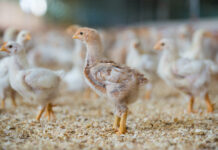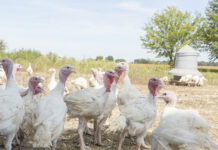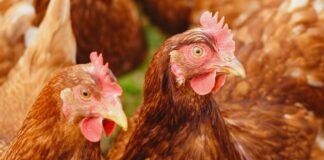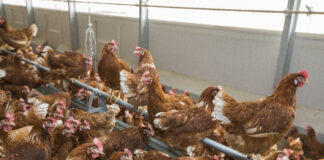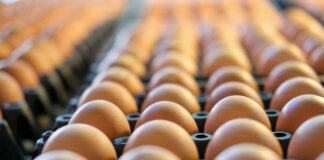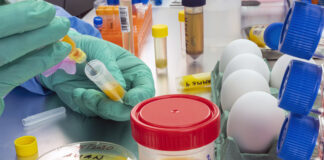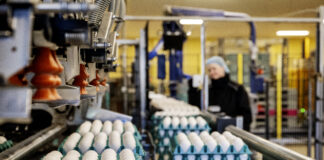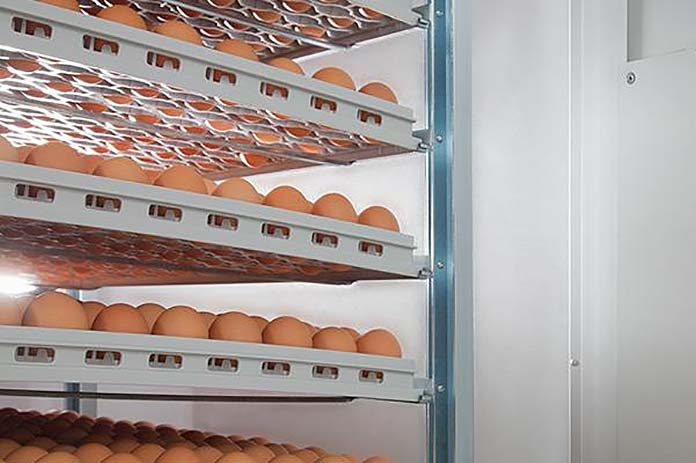
An alternative approach to improve functional traits alongside with the production efficiency of fast growing broiler chickens provides temperature training in the hatcher (PTT: perinatal temperature training from day 18 until hatching) with short-term mild warm loads. Temperature training of the developing thermoregulatory system during critical periods has long lasting effects on thermal adaptability and various body functions, because of the strong relationship between the central control of body temperature and body functions, like metabolism, feed intake and body weight regulation as well as immune und stress response.
The hypothesis is that perinatal temperature training improves robustness via long-lasting reduction of the basic metabolism. In previous experiments we found especially in male chickens a lower hypothalamic neuropeptide-Y (NPY) expression as long-lasting effect on basic metabolism after PTT. Hence, robust chickens have more energy available for adaptation, immune and stress responses during environmental challenges.
In two pilot studies (summer 2012, spring 2013) the influence of short-term perinatal temperature training on stress level and welfare in broiler chickens (Ross 308) was investigated. Eggs were incubated under commercial conditions using incubators with total capacity of 115.200 eggs (SmartSet™, Pas Reform Hatchery Technologies, Zeddam, NL).
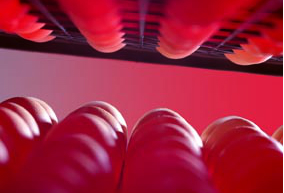 The eggs were incubated under standard single stage incubation programme (control) or with PTT in the hatcher (+ 1°C, maximum 2 hrs per day). Random sampling (120 males and 120 females) of hatched chickens from control and PTT group was used for subsequent broiler growth trial of 35 days in the experimental research station of the FLI ( Federal Research Institute for Animal Health, Institute for Animal Welfare and Husbandry in Celle, Germany). During the growing period locomotor activity was observed. On day 34 fear response was examined using a novel object test (NOT). Blood samples for hormone analysis (T3/4, cortisol, corticosterone) and preparation of blood smears for calculation of heterophile to lymphocyte ratio (HLR) were collected. Locomotor activity was not different between the groups. However, it must be pointed out that the chickens in the PTT group have a higher body weight compared with the control. In the NOT a slight tendency to less fear response was found. HLR was statistical significant lower in the PTT group than in the control group. Acute stress (e.g. during slaughtering) is typically related to increase in energy mobilization. Hence, our hypothesis was that PTT chickens, especially the males, can mobilize more energy during acute stress. This hypothesis was confirmed. Male chickens have higher increase in blood T3/T4 level during acute stress, which was accompanied by similar increase in stress hormone level (cortisol and corticosterone). In females only slight changes in metabolic and stress hormones were observed, which corresponds with NPY expression in a previous experiment. It has to be noted that all results are similar in both growing trials. It means that the long-lasting effect of PTT was repeatable.
The eggs were incubated under standard single stage incubation programme (control) or with PTT in the hatcher (+ 1°C, maximum 2 hrs per day). Random sampling (120 males and 120 females) of hatched chickens from control and PTT group was used for subsequent broiler growth trial of 35 days in the experimental research station of the FLI ( Federal Research Institute for Animal Health, Institute for Animal Welfare and Husbandry in Celle, Germany). During the growing period locomotor activity was observed. On day 34 fear response was examined using a novel object test (NOT). Blood samples for hormone analysis (T3/4, cortisol, corticosterone) and preparation of blood smears for calculation of heterophile to lymphocyte ratio (HLR) were collected. Locomotor activity was not different between the groups. However, it must be pointed out that the chickens in the PTT group have a higher body weight compared with the control. In the NOT a slight tendency to less fear response was found. HLR was statistical significant lower in the PTT group than in the control group. Acute stress (e.g. during slaughtering) is typically related to increase in energy mobilization. Hence, our hypothesis was that PTT chickens, especially the males, can mobilize more energy during acute stress. This hypothesis was confirmed. Male chickens have higher increase in blood T3/T4 level during acute stress, which was accompanied by similar increase in stress hormone level (cortisol and corticosterone). In females only slight changes in metabolic and stress hormones were observed, which corresponds with NPY expression in a previous experiment. It has to be noted that all results are similar in both growing trials. It means that the long-lasting effect of PTT was repeatable.


